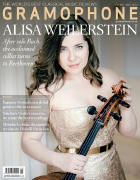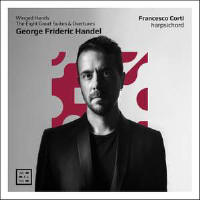Texte paru dans: / Appeared in: |
|
|
Outil de traduction |
|
|
Francesco Corti’s discography as a solo harpsichordist is not long, essentially consisting of two Bach releases – the Partitas some years ago (Berlin Classics, 12/10) and more recently some of his early pieces, received with pleasure in these pages (Arcana, 1/21). Judging by this recording of Handel’s ‘Eight Great Suites’ of 1720, we should be pestering for more, for here is an enthralling encounter with someone who surely conjures the same kind of forthright joy in the company of the instrument and its player as Handel was said to have done with his ‘uncommon brilliancy … fulness, force and energy’. These pieces have not always come out sounding like that. The music on the page asks a lot of a performer’s personal flair to bring it to life, and I was delighted when Pierre Hantaï applied his with such skill and wisdom to a recording of the first four suites last year (Mirare, 2/21). Corti’s, I would say, is an equal achievement, and perhaps a more complete one. He gives us all the suites, of course, but intersperses them with four opera overtures in what seem to be Handel’s own transcriptions, plus a clutch of pieces by enthusiastic virtuoso William Babell, including arrangements of numbers from Rinaldo. The result is like a compendium of baroque harpsichord stylings, from urbane dance forms to dazzling variation sets, contrapuntal explorations to sweetly turned aria melodies, and public-facing ‘orchestral’ overtures to improvisatory preludes intimate with the keyboard. But it is also a showcase of the range and effectiveness of Corti’s responses to them. He can make the harpsichord sing, quills caressing the strings in a delicate lyrical line such as ‘Lascia ch’io pianga’ (where the sweetringing tone of the single 8' stop on his copy of a 1738 Christian Vater instrument is a help), but he can also make it massive, like an organ in the Prelude of Suite No 3, or an orchestra in the opera overtures or the same suite’s final Presto. He shows a fantastic brilliance of hand, revealed not just in the virtuoso passagework but also in things like the whip-crack of the fullhanded dotted-rhythm chords in the Ouverture of No 7, and he can switch to simple elegance and refinement for Frenchstyle allemandes and courantes. Undoubtedly, though, it is his ornamentation that will catch the ear. As with Hantaï, it is a constant presence, freely complex and musical, yet it somehow has a more natural exuberance, and while the discernment with which he uses it makes it seem like he always has the right answer, you get the feeling that he could easily have found any number of other right answers. Thus, it never seems dutiful, but always has its place, adding to the music rather than obscuring or taking away, whether that’s keeping a line alive with exquisite righthand filigree embellishment, intensifying the ends of repeated sections with exuberant new patterns, releasing fluid streams of extra notes (including doublethirds at one point), creating weighty textural build-ups to add momentum and excitement to a variation set, or simply linking phrases together. Bravura stuff from a harpsichord magician.
|
|




